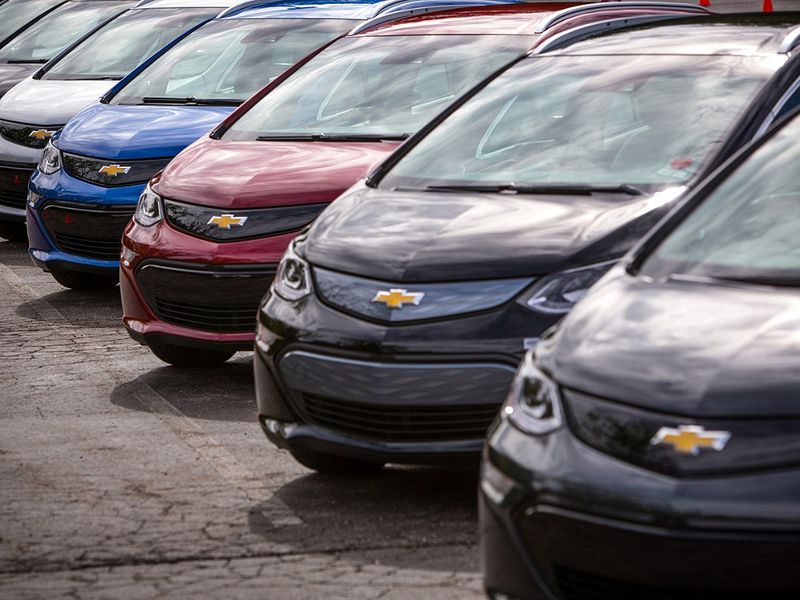
DETROIT — Ten months after the Chevrolet Bolt’s initial recall, General Motors has outlined two solutions to eliminate fire risk: module replacements starting next month and new diagnostic software that identifies potentially dangerous anomalies or damaged batteries, the automaker said Monday.
GM plans to send battery module replacements to dealers in mid-October and launch its diagnostic software, installed by dealers, in the next 60 days.
The drawn-out Bolt recall has become a black eye for GM and diminished trust among many customers as the automaker aims for an all-electric lineup by 2035 and rolls out a new generation of electric vehicles, starting with the GMC Hummer pickup this fall. The module replacement and diagnostic software mark GM’s next try at a fix after a separate software update, announced in April, failed to prevent battery fires.
Battery supplier LG has restarted production at its plants in Holland and Hazel Park, Mich., and the supplier is adding capacity to provide more battery cells to GM, according to a statement.
GM last month expanded a recall of the Bolt EV and EUV to include all model years — more than 110,000 cars in the U.S. The recall is costing GM some $1.8 billion, though much of the cost will likely be covered by LG. Dealers are not permitted to sell the Bolts until they have applied the recall repair, which varies by model year.
All Bolts are powered by GM’s previous-generation battery architecture, not the proprietary Ultium battery that will power its future EV lineup, which includes the GMC Hummer pickup and SUV, Cadillac Lyriq and Chevrolet Silverado EV.
Bolt batteries manufactured by LG and supplied to GM may have two manufacturing defects, a torn anode fab and a folded separator, in the same battery cell, which increases the risk of a fire, GM said. The defects have caused at least 12 GM-confirmed fires.
“We’re grateful for the patience of owners and dealers as we work to advance solutions to this recall,” Doug Parks, GM executive vice president, global product development, purchasing and supply chain, said in a statement. “Resuming battery module production is a first step and we’ll continue to work aggressively with LG to obtain additional battery supply. In addition, we’re optimistic a new advanced diagnostic software will provide more convenience for our customers.”
GM’s new software will be designed to spot specific abnormalities that could detect a damaged battery by monitoring performance, alerting customers of abnormalities and prioritizing damaged battery modules for replacement.
Once the diagnostic processes are complete, GM believes customers will be able to drive their Bolts fully charged, rather than follow the recall guidance of 90 percent.
GM will replace all modules in the 2017-2019 models, but only defective modules in the 2020-2022 Bolts. Batteries with the new modules will come with an 8-year/100,000-mile limited warranty, GM said.
Chevy dealers will install the software on 2017-19 models waiting on module replacements, and it will run the software on 2020-22 models to determine whether they need module replacements. If the diagnostics on the 2020-22 models show no abnormalities, customers will be able to drive, charge and park their vehicles as usual, without following the recall guidance.
For 2017-19 model year Bolt owners who must receive module replacements, the replacement timeline will be based on vehicles’ build window and the owner’s charging behavior. Owners who run their batteries to zero and then fully charge will get replacements first because those habits add to fire risk, said spokesman Kevin Kelly.
GM’s Orion Assembly in Michigan, which builds the Chevy Bolt EV and EUV, has been down since Aug. 23 and will remain idle until at least Oct. 15 as GM and LG work on the battery packs.
The initial recall of 68,667 Bolts — 2017, 2018 and some 2019 models — began in November.
Bolts built for the 2017 and 2018 model years used the LG Chem batteries made in South Korea. Select 2019 models were excluded from the initial recall because their batteries were made in Holland, Mich. GM previously said Bolts built with the Michigan batteries were not affected.
GM issued a software fix, but when fires continued after the software update, GM recalled the vehicles again in July.
By August, the recall had grown to include all 110,000 Bolts, from the 2017 to 2022 model years.

